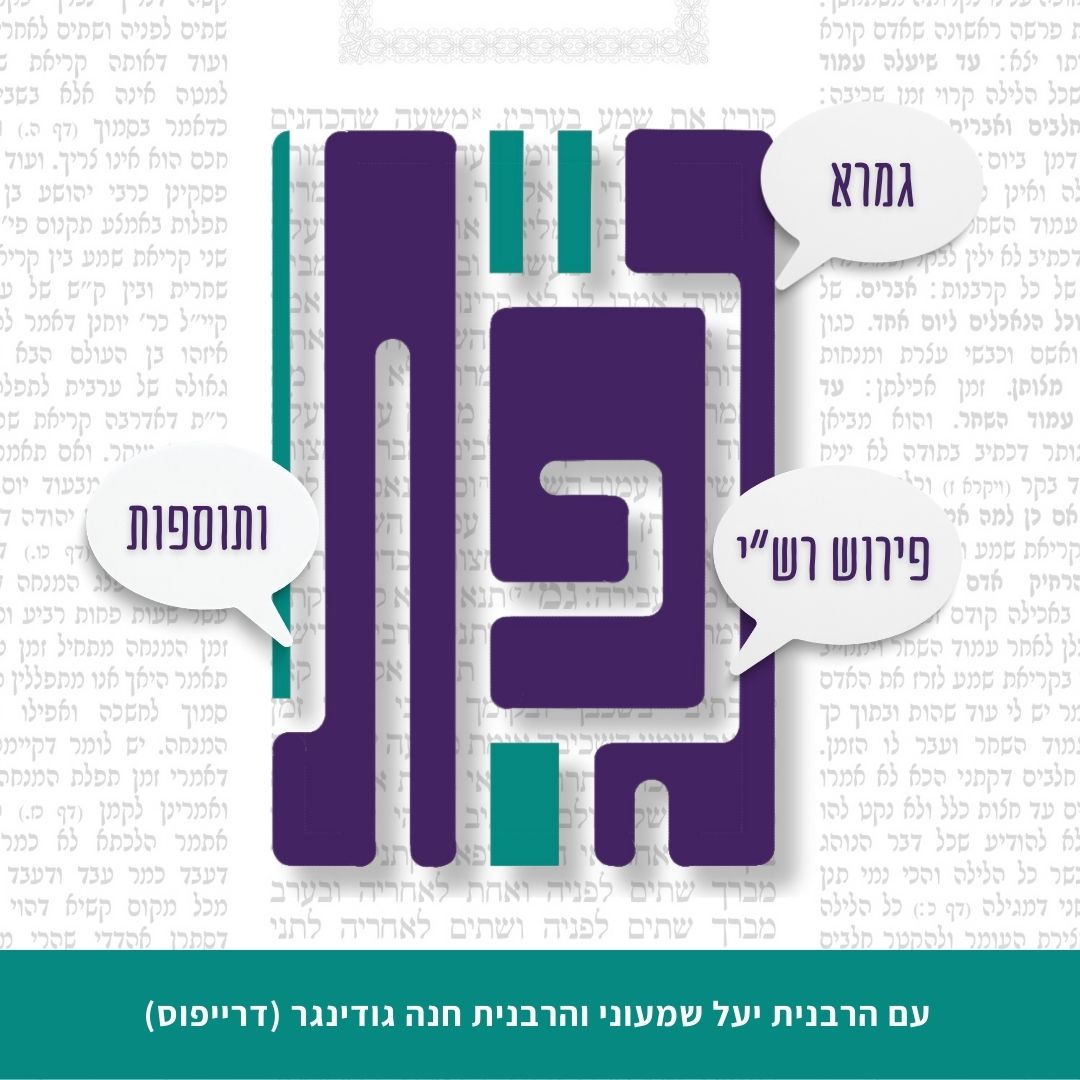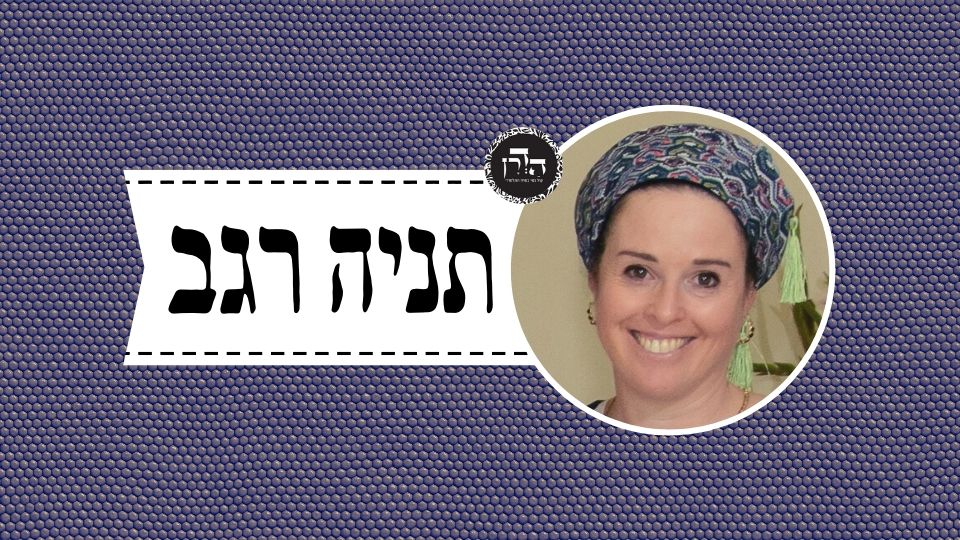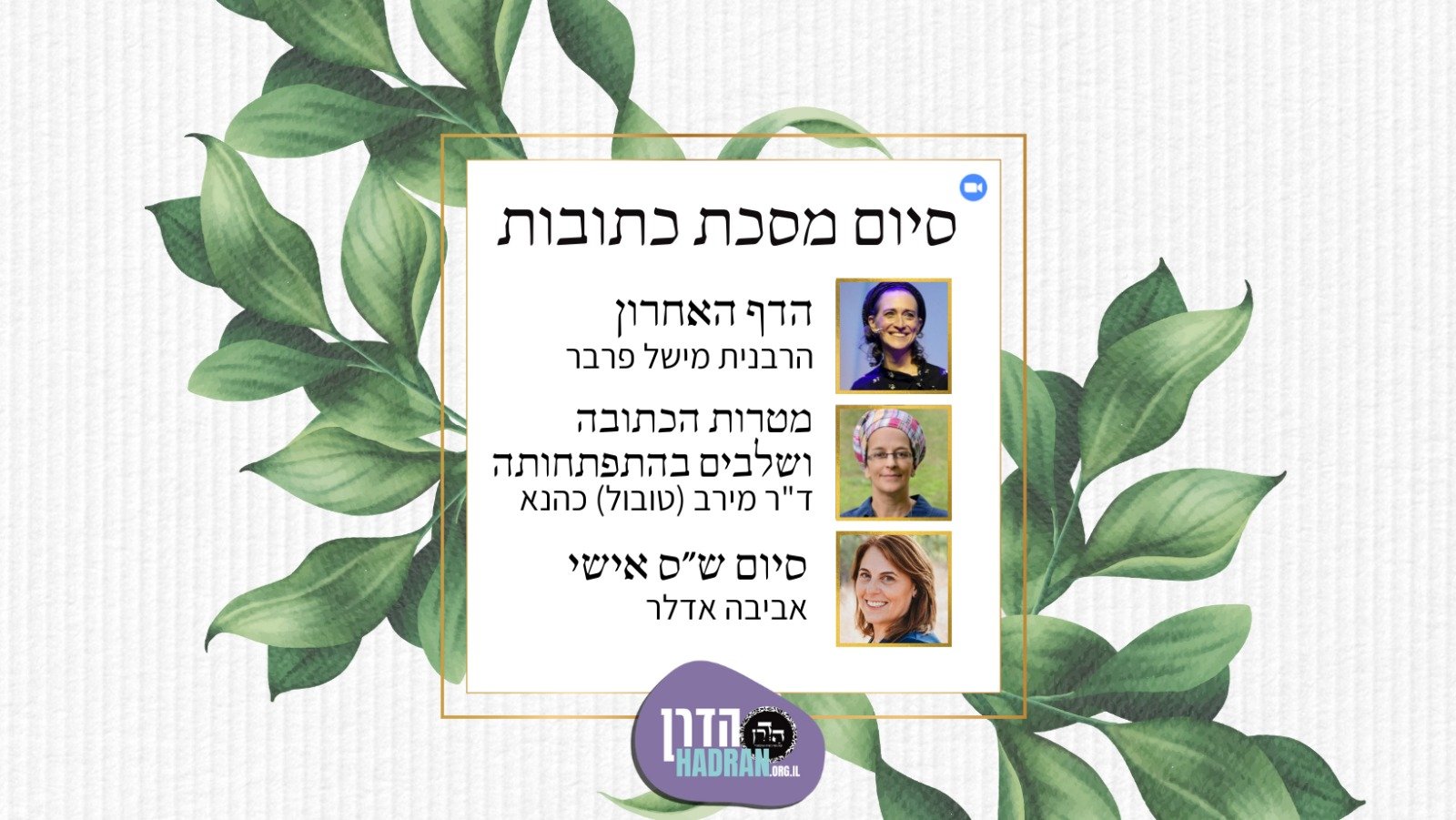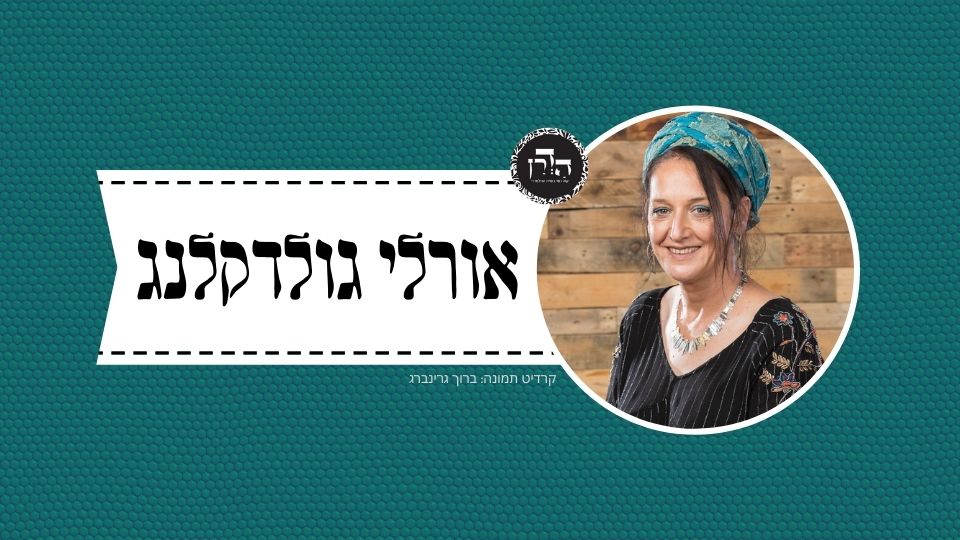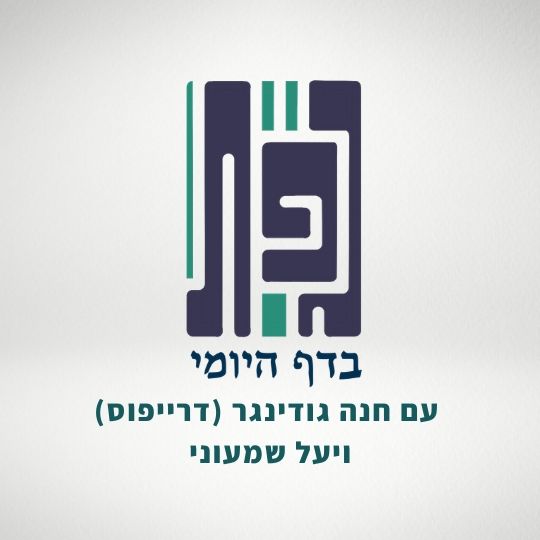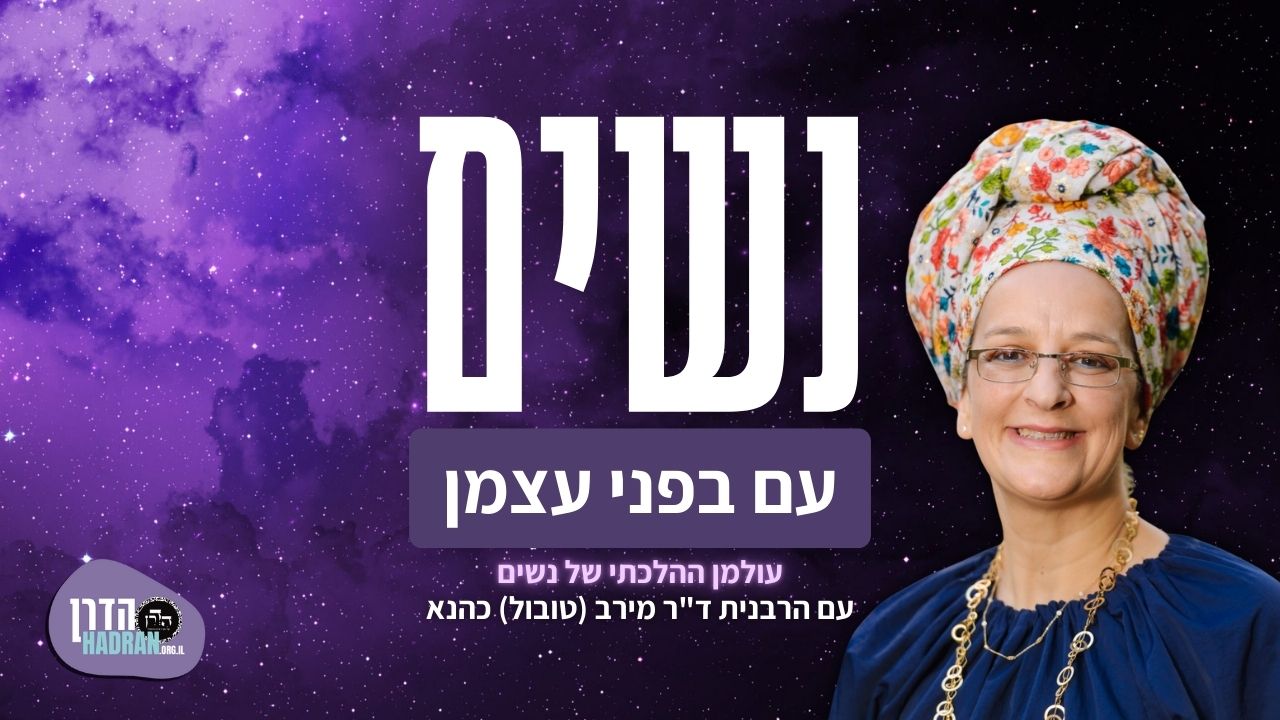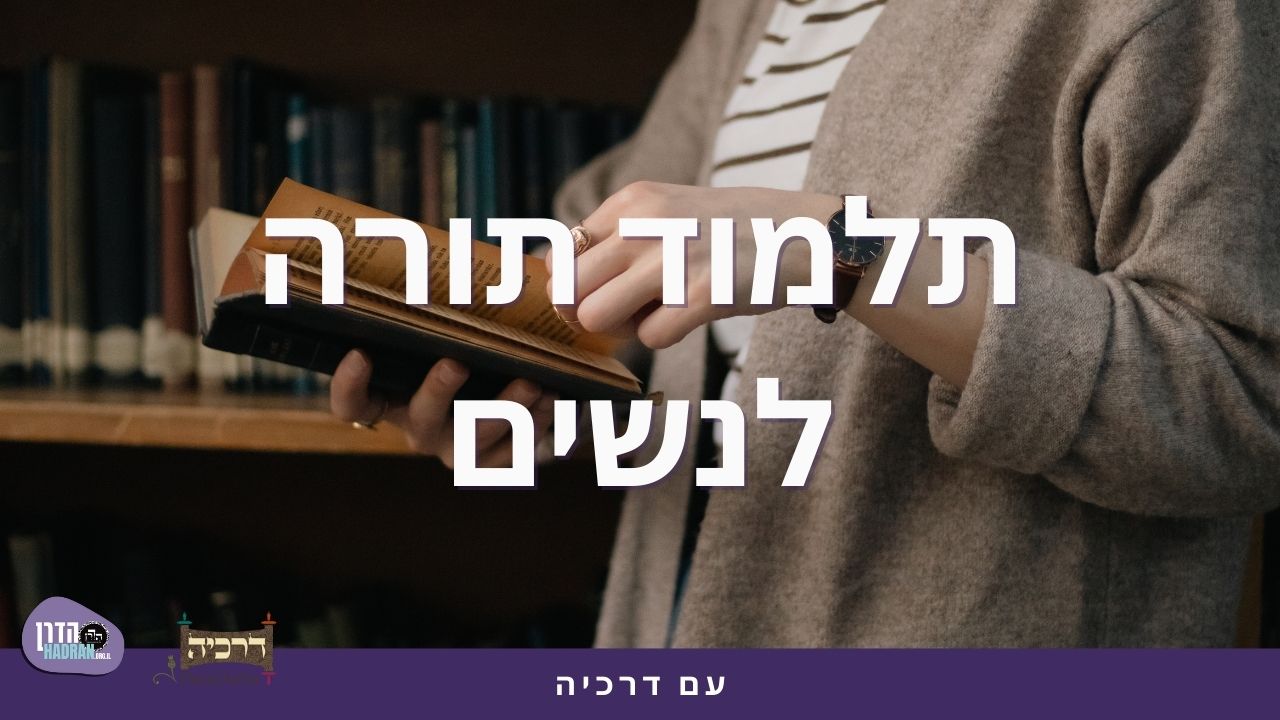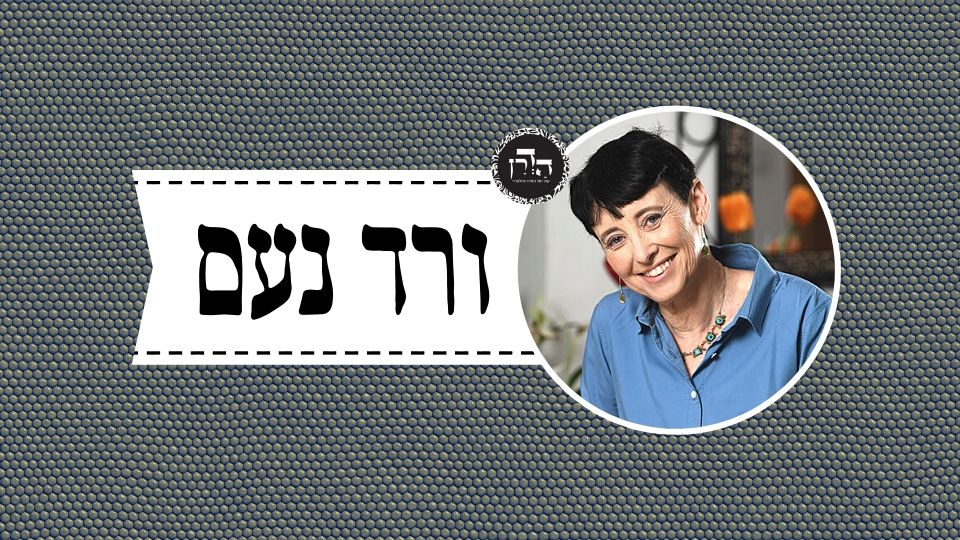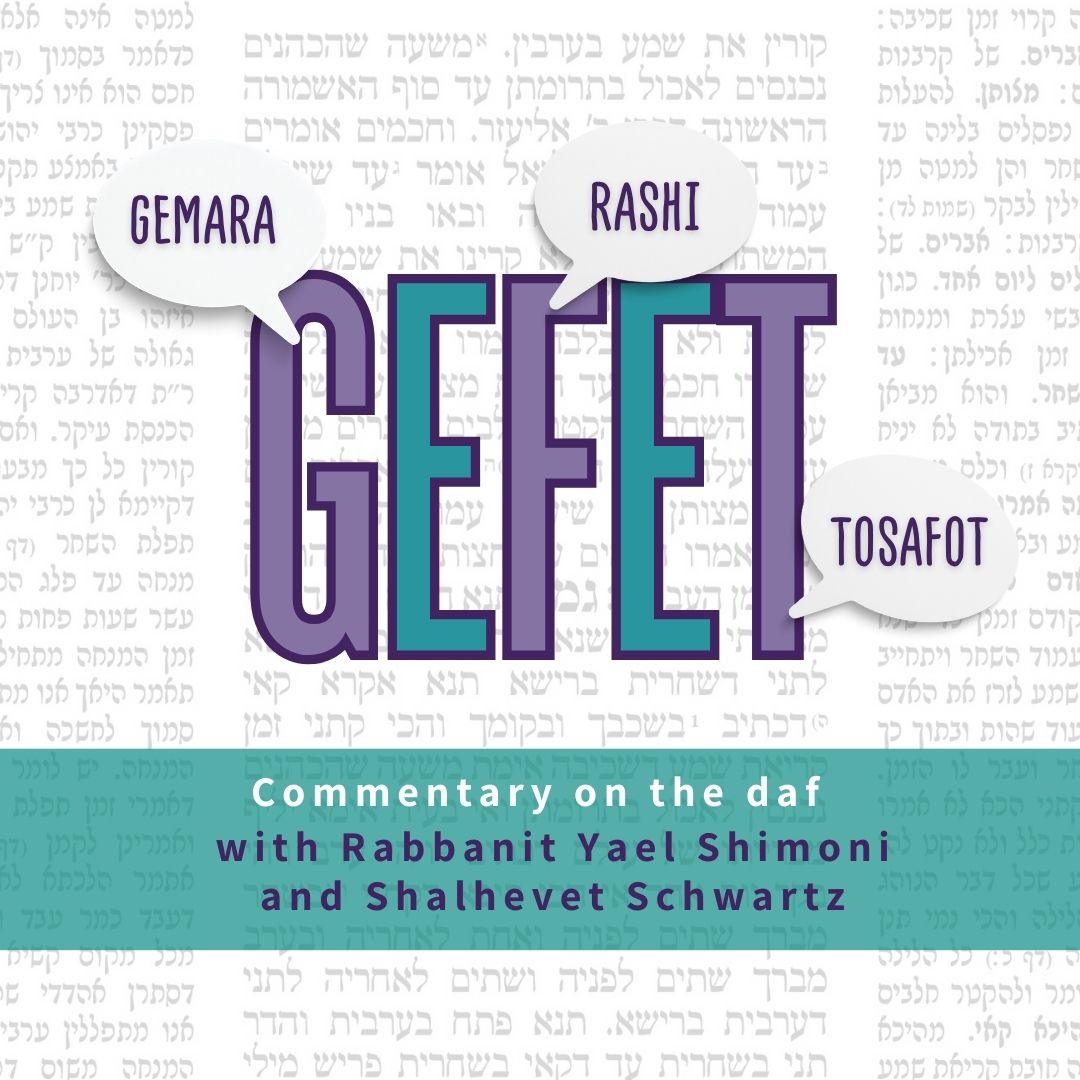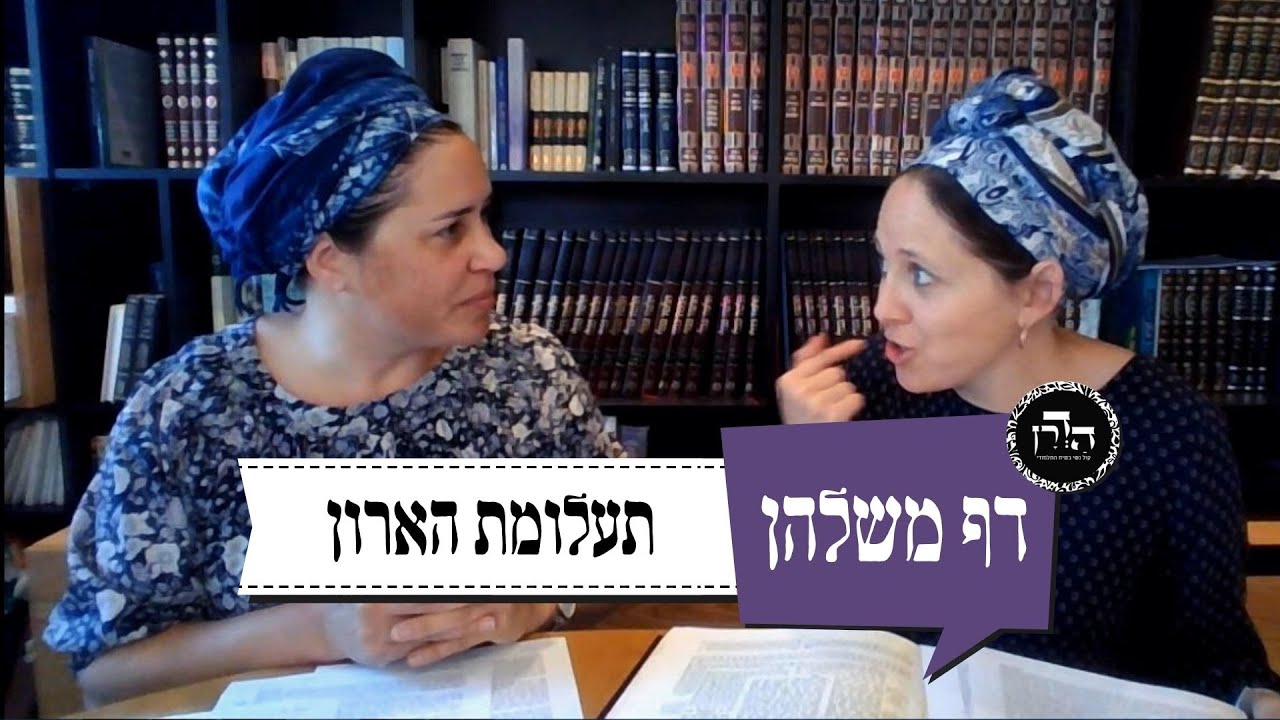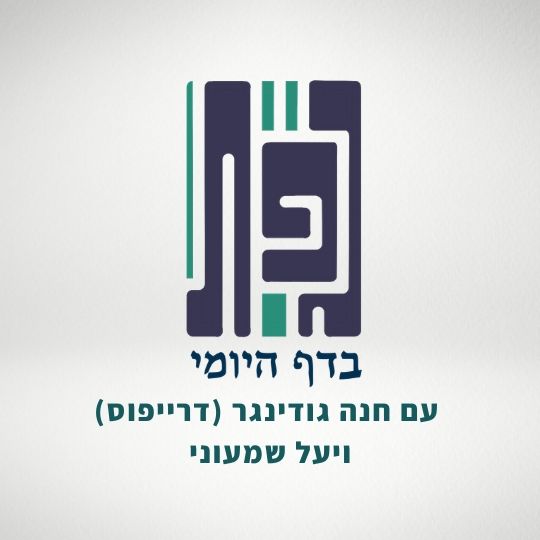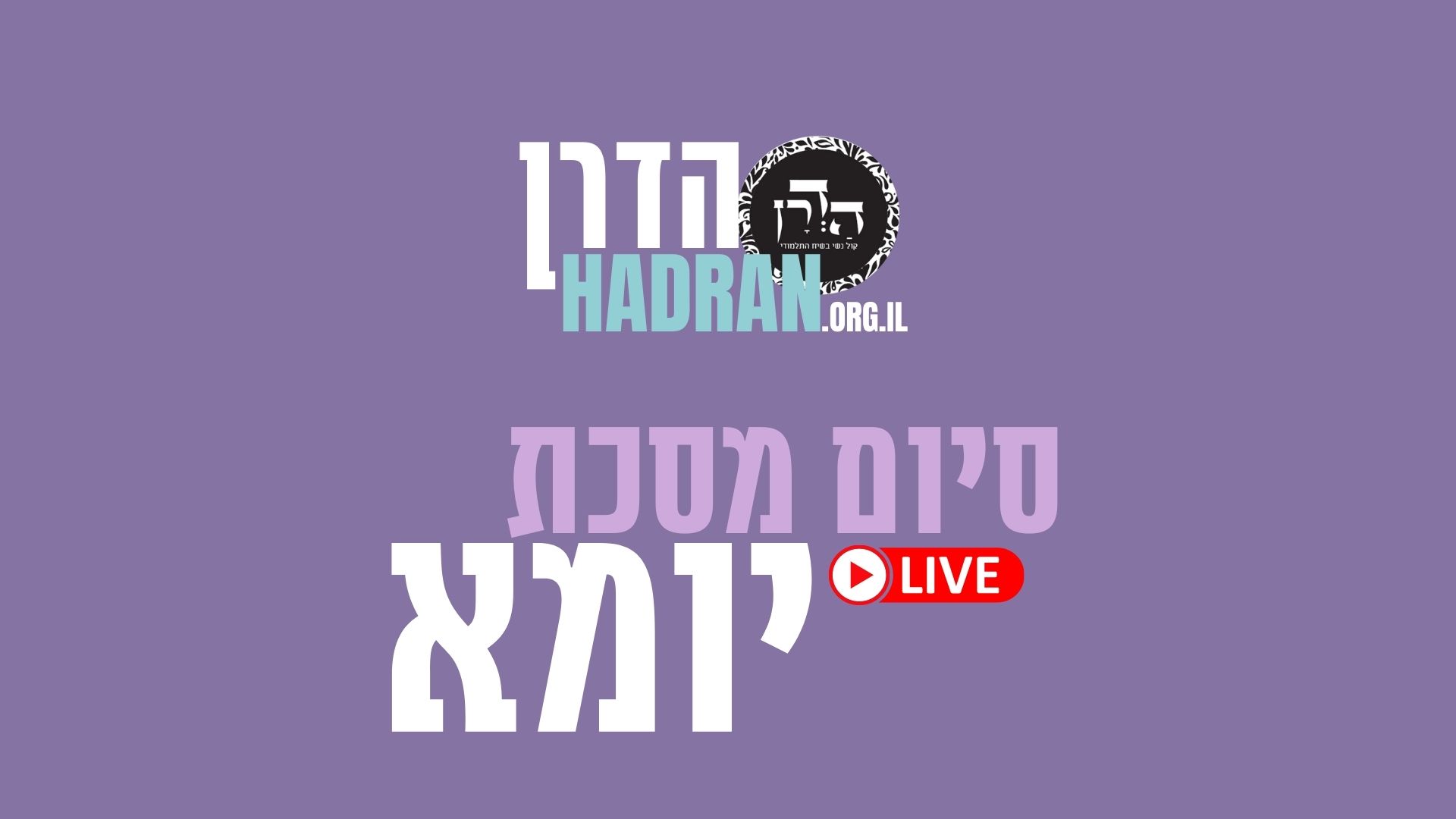עיסה שמוכנה כבר להפריש חלה, דינה כחלה לעניין ספק טומאה. הגמרא מקשה ממקרה של מעת לעת בחולין שנעשו על טהרת התרומה ששם אין ספק טומאה נוהגת – כי הגמרא מניחה שחילון הטבולים לחלה (שכבר אפשר להפריש מהם חלה) שווים לחולין שנעשו על טהרת התרומה. הגמרא מביאה שני תירוצים. ר’ אליעזר בן הורקנוס ור’ יהושע חולקים לגבי איזה נשים דיין שעתן. למה העדיפו שיטת ר’ אליעזר אבל רק פסקו כמותו רק לאחר מיתתו? מהן ההגדרות של ארבעת הנשים שעליהם דיבר ר’ אליעזר? באיזה מקרים אחרים פוסקים ר’ אליעזר?

כלים
הלימוד החודש מוקדש לרפואת פיליס הכט, גיטל פעשא בת מאשה רחל על ידי חברותיה הרבות שאוהבות ומעריכות אותה.
כלים
העמקה
רוצה להבין מה באמת קורה מתחת לפני השטח של הסוגיה?
שיעורים, פודקאסטים והרחבות של מיטב המורות שלנו יפתחו לך עוד זוויות וכיווני חשיבה.
חדשה בלימוד הגמרא?
זה הדף הראשון שלך? איזו התרגשות עצומה! יש לנו בדיוק את התכנים והכלים שיעזרו לך לעשות את הצעדים הראשונים ללמידה בקצב וברמה שלך, כך תוכלי להרגיש בנוח גם בתוך הסוגיות המורכבות ומאתגרות.
פסיפס הלומדות שלנו
גלי את קהילת הלומדות שלנו, מגוון נשים, רקעים וסיפורים. כולן חלק מתנועה ומסע מרגש ועוצמתי.
נדה ז
וְחַלָּתָהּ תְּלוּיָה, לֹא אוֹכְלִין וְלֹא שׂוֹרְפִין. בְּאֵיזֶה סָפֵק אָמְרוּ? בִּסְפֵק חַלָּה. מַאי סְפֵק חַלָּה?
And as the ḥalla of this kneaded, untithed dough is in a state of uncertain purity, its status is suspended: It is neither eaten like ritually pure ḥalla, nor is it burned like impure ḥalla. With regard to which uncertainty did they state this halakha? With regard to ḥalla of uncertain status. The Gemara asks: What is the meaning of the concept of ḥalla of uncertain status? This apparently indicates a scenario of possible ritual impurity that applies specifically to ḥalla, not to non-sacred food.
אַבָּיֵי וְרָבָא דְּאָמְרִי תַּרְוַיְיהוּ: שֶׁלֹּא תֹּאמַר בְּהוֹכָחוֹת שָׁנִינוּ כְּמוֹ שְׁנֵי שְׁבִילִין, דְּהָתָם חוּלִּין גְּרֵידָא נָמֵי מְטַמּוּ.
Abaye and Rava both say: One should not say that we learned this case of ḥalla of uncertain status among the cases of equal proofs, i.e., an unresolvable uncertainty, such as the case of two paths, where someone walked down one of two paths, one of which was ritually impure and the other ritually pure, and he does not remember which one he walked down. As there, even regular non-sacred food is also rendered ritually impure due to uncertainty.
אֶלָּא בְּנִשְׁעָן, דִּתְנַן: זָב וְטָהוֹר שֶׁהָיוּ פּוֹרְקִין מִן הַחֲמוֹר אוֹ טוֹעֲנִין, בִּזְמַן שֶׁמַּשָּׂאָן כָּבֵד — טָמֵא, מַשָּׂאָן קַל — טָהוֹר, וְכוּלָּן טְהוֹרִין לִבְנֵי הַכְּנֶסֶת, וּטְמֵאִין לִתְרוּמָה.
Rather, the uncertainty referred to here is similar to the less likely case of leaning, as we learned in a mishna (Zavim 3:2): In a case of a zav and a ritually pure person who were unloading a package from a donkey or who were loading a package onto a donkey, when their package is heavy the pure person is rendered impure, as perhaps the zav leaned on him while they handled the package together. If their package is light, he remains pure. And in all those cases, he remains ritually pure even if he is one of the members of a synagogue whose congregants handle non-sacred food according to the standards of sacrificial food, as this is not a true case of a zav moving a pure person. But he is impure with regard to matters involving teruma, by rabbinic law.
וְחוּלִּין הַטְּבוּלִין לְחַלָּה כְּחַלָּה דָּמוּ? וְהָתַנְיָא: אִשָּׁה שֶׁהִיא טְבוּלַת יוֹם, לָשָׁה אֶת הָעִיסָּה, וְקוֹצָה הֵימֶנָּה חַלָּתָהּ, וּמַנִּיחָתָהּ בִּכְפִישָׁה אוֹ בְּאַנְחוּתָא, וּמַקֶּפֶת וְקוֹרָא לָהּ שֵׁם.
The Gemara asks: And is non-sacred food that is untithed with regard to the obligation to separate ḥalla really considered like ḥalla to the extent that it is rendered impure even in a case of leaning? But isn’t it taught in a baraita: With regard to a woman who immersed that day and is waiting for nightfall for the purification process to be completed, she may separate ḥalla: She may knead the dough, and separate its ḥalla from it, and place the separated dough into a wicker basket or a wooden board [be’anḥuta], and subsequently she may bring it near the rest of the dough, and she may then designate it ḥalla by name.
מִפְּנֵי שֶׁהוּא שְׁלִישִׁי, וּשְׁלִישִׁי טָהוֹר בְּחוּלִּין, וְאִי אָמְרַתְּ ״חוּלִּין הַטְּבוּלִין לְחַלָּה כְּחַלָּה דָּמוּ״, הָא טַמֵּיתִנְהוּ!
The baraita continues: The reason that this is allowed, despite her impurity, is because the dough is impure by third-degree ritual impurity, and an item that has third-degree impurity is considered pure with regard to non-sacred food. The Gemara concludes its question: And if you say that non-sacred food that is untithed with regard to the obligation to separate ḥalla is considered like ḥalla, then she should render it impure with her touch, just as she would render actual ḥalla impure.
אָמַר אַבָּיֵי: כֹּל שֶׁוַּדַּאי מְטַמֵּא חוּלִּין — גָּזְרוּ עַל סְפֵקוֹ מִשּׁוּם חוּלִּין הַטְּבוּלִין לְחַלָּה, וְהַאי טְבוּל יוֹם, כֵּיוָן דְּלֹא מְטַמֵּא וַדַּאי חוּלִּין — לֹא גָּזְרוּ עָלָיו מִשּׁוּם חוּלִּין הַטְּבוּלִין לְחַלָּה.
Abaye says: With regard to any item that when it is definitely impure renders non-sacred food impure, as in the case of the zav, the Sages issued a decree that its uncertain impurity should also render non-sacred food items impure, due to its status as non-sacred food that is untithed with regard to ḥalla. But with regard to this case of one who immersed that day, since even when she is definitely impure she does not render non-sacred food impure, they did not issue a decree that she should render that dough impure due to its status as non-sacred food that is untithed with regard to ḥalla.
וְהָא מֵעֵת לְעֵת שֶׁבְּנִדָּה, דְּוַדַּאי מְטַמֵּא חוּלִּין — וְלֹא גָּזְרוּ עַל סְפֵקָהּ מִשּׁוּם חוּלִּין הַטְּבוּלִין לְחַלָּה!
The Gemara asks: But what about the twenty-four-hour period of retroactive impurity of a menstruating woman? As a definitely impure menstruating woman renders non-sacred food impure and nevertheless with regard to untithed dough the Sages did not issue a decree to treat her uncertain impurity as definite impurity due to the dough’s status as non-sacred food that is untithed with regard to ḥalla.
דְּאָמַר מָר: קַבְּלַהּ מִינֵּיהּ רַב שְׁמוּאֵל בַּר רַב יִצְחָק, בְּחוּלִּין שֶׁנַּעֲשׂוּ עַל טׇהֳרַת קֹדֶשׁ, וְלֹא בְּחוּלִּין שֶׁנַּעֲשׂוּ עַל טׇהֳרַת תְּרוּמָה!
The Gemara cites its source for this claim: As the Master said: Rav Shmuel bar Rav Yitzḥak received from Rav Naḥman: The retroactive impurity of a menstruating woman transmits impurity to non-sacred food items that were prepared according to the standards of purity of sacrificial food, but not to non-sacred food items that were prepared according to the standards of purity of teruma. It is assumed that the level of purity required for non-sacred food items prepared according to the standards required of teruma is the same as that of dough from which ḥalla has not been separated, i.e., it is not treated as real ḥalla, which is rendered impure by her retroactive twenty-four-hour period of impurity.
הָתָם לָא פְּתִיכָא בְּהוּ תְּרוּמָה, הָכָא פְּתִיכָא בְּהוּ תְּרוּמָה.
The Gemara answers: The level of purity required for non-sacred food items that were prepared according to the standards of purity of teruma is actually lower than the level required for dough from which ḥalla has not been separated. The reason is that there, in the case of non-sacred food items, there is no actual teruma mixed in it. By contrast, here, in the case of untithed dough, there is teruma, i.e., ḥalla, mixed in it, which will eventually be separated from this dough.
וְאִיבָּעֵית אֵימָא: הַנַּח מֵעֵת לְעֵת — דְּרַבָּנַן.
If you wish, say instead: Leave aside the twenty-four-hour period of retroactive impurity of a menstruating woman, as it applies by rabbinic law. One cannot raise a difficulty against the principle that untithed dough is treated with the same level of purity as ḥalla from the case of the retroactive impurity of a menstruating woman, since that retroactive impurity is a rabbinic decree, and therefore there is more room for leniency.
מַתְנִי’ רַבִּי אֱלִיעֶזֶר אוֹמֵר: אַרְבַּע נָשִׁים דַּיָּין שְׁעָתָן — בְּתוּלָה, מְעוּבֶּרֶת, מְנִיקָה, וּזְקֵינָה. אָמַר רַבִּי יְהוֹשֻׁעַ: אֲנִי לֹא שָׁמַעְתִּי אֶלָּא בְּתוּלָה.
MISHNA: Rabbi Eliezer says: Unlike the women with regard to whom it was taught that they transmit impurity retroactively, there are four women who discern menstrual blood and their time is sufficient, i.e., they transmit impurity only from the moment that they saw the blood: A virgin, a pregnant woman, a nursing woman, and an elderly woman. Rabbi Yehoshua says: I heard this halakha from my teachers only with regard to a virgin,
אֲבָל הֲלָכָה כְּרַבִּי אֱלִיעֶזֶר.
but the halakha is in accordance with the opinion of Rabbi Eliezer.
אֵיזוֹ הִיא בְּתוּלָה — כֹּל שֶׁלֹּא רָאֲתָה דָּם מִיָּמֶיהָ, אַף עַל פִּי שֶׁנְּשׂוּאָה. מְעוּבֶּרֶת — מִשֶּׁיִּוָּדַע עוּבָּרָהּ. מְנִיקָה — עַד שֶׁתִּגְמוֹל אֶת בְּנָהּ. נָתְנָה בְּנָהּ לִמְנִיקָה, גְּמָלַתּוּ, אוֹ מֵת — רַבִּי מֵאִיר אוֹמֵר: מְטַמְּאָה מֵעֵת לְעֵת, וַחֲכָמִים אוֹמְרִים: דַּיָּהּ שְׁעָתָהּ.
Who is the woman characterized as a virgin in this context? It is any woman who has not seen the flow of menstrual blood in all her days, even if she was married and has experienced bleeding as a result of intercourse consummating her marriage. The time of a pregnant woman is from the point in her pregnancy when the existence of her fetus is known to all who see her. The time of a nursing woman is until she weans her child from nursing. If she stopped nursing, e.g., she gave her child to a wet nurse, weaned him from nursing, or her child died, and she saw menstrual blood, Rabbi Meir says: She transmits impurity for a twenty-four-hour period or from her most recent examination. And the Rabbis say: Even in those cases, her time is sufficient.
אֵיזוֹהִי זְקֵנָה — כֹּל שֶׁעָבְרוּ עָלֶיהָ שָׁלֹשׁ עוֹנוֹת סָמוּךְ לְזִקְנָתָהּ. רַבִּי אֱלִיעֶזֶר אוֹמֵר: כׇּל אִשָּׁה שֶׁעָבְרוּ עָלֶיהָ שָׁלֹשׁ עוֹנוֹת — דַּיָּהּ שְׁעָתָהּ. רַבִּי יוֹסֵי אוֹמֵר: מְעוּבֶּרֶת וּמְנִיקָה שֶׁעָבְרוּ עֲלֵיהֶן שָׁלֹשׁ עוֹנוֹת — דַּיָּין שְׁעָתָן.
Who is the woman characterized as an elderly woman in this context? It is any woman for whom three typical menstrual cycles of thirty days passed during which she saw no menstrual blood, at a stage of her life close to her old age. Rabbi Eliezer says: In the case of any woman for whom three typical menstrual cycles passed during which she saw no menstrual blood, if she then experiences bleeding, her time is sufficient. Rabbi Yosei says: With regard to a pregnant woman and a nursing woman for whom three typical menstrual cycles passed during which they saw no menstrual blood, if they then saw blood, their time is sufficient.
וּבַמָּה אָמַר ״דַּיָּהּ שְׁעָתָהּ״ — בִּרְאִיָּיה רִאשׁוֹנָה, אֲבָל בַּשְּׁנִיָּה מְטַמְּאָה מֵעֵת לְעֵת, וְאִם רָאֲתָה הָרִאשׁוֹנָה מֵאוֹנֶס — אַף הַשְּׁנִיָּה דַּיָּהּ שְׁעָתָהּ.
And in the above cases, with regard to what did the tanna say her time is sufficient? It is with regard to the first sighting of blood, but with regard to the second sighting, her status is like that of any other woman, and she transmits impurity for a twenty-four-hour period or from her most recent examination. And if she saw the first sighting as a result of unnatural circumstances, even with regard to the second sighting, the halakha is that her time is sufficient.
גְּמָ’ תַּנְיָא: אָמַר לוֹ רַבִּי אֱלִיעֶזֶר לְרַבִּי יְהוֹשֻׁעַ: אַתָּה לֹא שָׁמַעְתָּ, אֲנִי שָׁמַעְתִּי; אַתָּה לֹא שָׁמַעְתָּ אֶלָּא אַחַת, וַאֲנִי שָׁמַעְתִּי הַרְבֵּה.
GEMARA: Rabbi Eliezer teaches in the mishna that there are four women who transmit impurity only from the moment that they saw menstrual blood, not retroactively. Rabbi Yehoshua said: I heard this halakha from my teachers only with regard to a virgin. The Gemara notes that it is taught in a baraita that Rabbi Eliezer said to Rabbi Yehoshua: You did not hear, but I did hear it. In other words, you may not have received a tradition from your teachers with regard to any other woman, but I did receive such a tradition. Furthermore, you heard a halakhic ruling with regard to only one woman, and I heard rulings with regard to many women.
אֵין אוֹמְרִים לְמִי שֶׁלֹּא רָאָה אֶת הַחֹדֶשׁ ״יָבֹא וְיָעִיד״, אֶלָּא לְמִי שֶׁרָאָהוּ. כׇּל יָמָיו שֶׁל רַבִּי אֱלִיעֶזֶר הָיוּ עוֹשִׂין כְּרַבִּי יְהוֹשֻׁעַ, לְאַחַר פְּטִירָתוֹ שֶׁל רַבִּי אֱלִיעֶזֶר הֶחְזִיר רַבִּי יְהוֹשֻׁעַ אֶת הַדָּבָר לְיוֹשְׁנוֹ.
Rabbi Eliezer continued his rebuttal with a metaphor from the practice of sanctifying the new moon, which required the testimony of witnesses: We do not say to one who had not seen the new moon to come and testify. Rather we give such an instruction only to he who saw it. Similarly, my opinion is weightier with regard to this issue, as I heard many rulings about the matter, whereas you did not. The Gemara reports: All the days of the life of Rabbi Eliezer, they would practice in accordance with the opinion of Rabbi Yehoshua, i.e., only a virgin would be exempt from retroactive impurity. After Rabbi Eliezer’s passing, Rabbi Yehoshua returned the matter to its former custom, which was to follow the opinion of Rabbi Eliezer.
כְּרַבִּי אֱלִיעֶזֶר, בְּחַיָּיו מַאי טַעְמָא לָא? מִשּׁוּם דְּרַבִּי אֱלִיעֶזֶר שַׁמּוּתִי הוּא, וְסָבַר: אִי עָבְדִינַן כְּוָותֵיהּ בַּחֲדָא, עָבְדִינַן כְּוָותֵיהּ בְּאַחְרָנְיָיתָא.
The Gemara asks: What is the reason that they did not act in accordance with the opinion of Rabbi Eliezer during his lifetime? The Gemara answers: Because Rabbi Eliezer was a Shammuti, i.e., a follower of the rulings of Beit Shammai, and the halakha is generally in accordance with the opinion of Beit Hillel in their disputes with Beit Shammai. And the Sages held that if we act in accordance with his opinion in one matter, people will act in accordance with his opinion in other matters.
וּמִשּׁוּם כְּבוֹדוֹ דְּרַבִּי אֱלִיעֶזֶר, לָא מָצֵינַן מָחֵינַן בְּהוּ. לְאַחַר פְּטִירָתוֹ שֶׁל רַבִּי אֱלִיעֶזֶר (דְּמָצִינוּ) [דְּמָצֵינַן] מָחֵינַן בְּהוּ, הֶחְזִיר אֶת הַדָּבָר לְיוֹשְׁנוֹ.
And that would be a problem, as if so, then during his lifetime, due to the honor of Rabbi Eliezer, we will not be able to protest against them. But after Rabbi Eliezer’s passing, when we are able to protest against those who act in accordance with Rabbi Eliezer’s opinion in other matters, Rabbi Yehoshua returned the matter to its former custom of deciding the halakha in accordance with the opinion of Rabbi Eliezer in this matter.
אָמַר רַב יְהוּדָה, אָמַר שְׁמוּאֵל: הֲלָכָה כְּרַבִּי אֱלִיעֶזֶר בְּאַרְבַּע. חֲדָא: דַּאֲמַרַן.
§ The Gemara mentions other instances in which the halakha is in accordance with the opinion of Rabbi Eliezer. Rav Yehuda says that Shmuel says: The halakha is in accordance with the opinion of Rabbi Eliezer in four cases. One is the halakha that we just mentioned, of the four women who transmit ritual impurity only from the time of their sighting and onward.
וְאִידָּךְ: הַמְקַשָּׁה כַּמָּה תִּשְׁפֶּה וּתְהֵא זָבָה? מֵעֵת לְעֵת, דִּבְרֵי רַבִּי אֱלִיעֶזֶר, וַהֲלָכָה כִּדְבָרָיו.
And another is taught in a baraita with regard to a woman who experiences labor pain as a result of which she sees a flow of blood. Her discharge is attributed to childbirth rather than zava blood. The baraita asks: For how long must she be relieved from pain in order to be considered a zava due to her flow of uterine blood? She must have relief for a twenty-four-hour period. This is the statement of Rabbi Eliezer. And the halakha is in accordance with his statement.
וְאִידָּךְ: הַזָּב וְהַזָּבָה שֶׁבָּדְקוּ עַצְמָן יוֹם רִאשׁוֹן וּמָצְאוּ טָהוֹר, יוֹם שְׁבִיעִי וּמָצְאוּ טָהוֹר, וּשְׁאָר הַיָּמִים לֹא בָּדְקוּ — רַבִּי אֱלִיעֶזֶר אוֹמֵר: הֲרֵי אֵלּוּ בְּחֶזְקַת טׇהֳרָה. רַבִּי יְהוֹשֻׁעַ אוֹמֵר: אֵין לָהֶן אֶלָּא יוֹם הָרִאשׁוֹן וְיוֹם הַשְּׁבִיעִי בִּלְבָד.
And another case in which the halakha follows Rabbi Eliezer is taught in a mishna (68b): A zav and a zava must observe seven days without a discharge in order to attain ritual purity. With regard to a zav or a zava who examined themselves on the first day and found themselves to be pure, and they examined themselves on the seventh day and found themselves to be pure, but on the rest of the intervening days they did not examine themselves, Rabbi Eliezer says: The presumptive status of the zav and the zava is one of ritual purity. Rabbi Yehoshua says: In that case, the zav and the zava have counted only the first day and the seventh day, two of the seven clean days, and they must count another five days to complete the tally.
רַבִּי עֲקִיבָא אוֹמֵר: אֵין לָהֶם אֶלָּא יוֹם שְׁבִיעִי בִּלְבָד. וְתַנְיָא: רַבִּי שִׁמְעוֹן וְרַבִּי יוֹסֵי אוֹמְרִים: נִרְאִין דִּבְרֵי רַבִּי אֱלִיעֶזֶר מִדִּבְרֵי רַבִּי יְהוֹשֻׁעַ, וְדִבְרֵי רַבִּי עֲקִיבָא מִדִּבְרֵי כוּלָּן, אֲבָל הֲלָכָה כְּרַבִּי אֱלִיעֶזֶר.
The mishna continues: Rabbi Akiva says: Since any impure discharge that they might have experienced in between the first and seventh days would negate their count and require them to restart the seven-day period, the zav and the zava have counted only the seventh day, and must count another six days to complete the tally. And with regard to this dispute, it is taught in a baraita that Rabbi Shimon and Rabbi Yosei say: The statement of Rabbi Eliezer appears more correct than the statement of Rabbi Yehoshua, and the statement of Rabbi Akiva appears more correct than the statement of all of them. But the halakha is in accordance with the opinion of Rabbi Eliezer.
וְאִידַּךְ, דִּתְנַן: אֲחוֹרֵי כֵלִים שֶׁנִּטְמְאוּ בְּמַשְׁקִין, רַבִּי אֱלִיעֶזֶר אוֹמֵר: מְטַמְּאִין אֶת הַמַּשְׁקִין וְאֵין פּוֹסְלִין אֶת הָאֳוכָלִין. מְטַמְּאִין אֶת הַמַּשְׁקִין, וַאֲפִילּוּ דְּחוּלִּין, וְאֵין פּוֹסְלִין אֶת הָאֳוכָלִין, וַאֲפִילּוּ דִּתְרוּמָה. רַבִּי יְהוֹשֻׁעַ אוֹמֵר: מְטַמְּאִין אֶת הַמַּשְׁקִין וּפוֹסְלִין אֶת הָאֳוכָלִין.
And the other case in which the halakha is in accordance with the opinion of Rabbi Eliezer is as we learned in a mishna (Teharot 8:7): With regard to the exterior of vessels that contracted ritual impurity through contact with impure liquids, i.e., with liquids that had touched the carcass of a creeping animal, Rabbi Eliezer says, with regard to this impurity that applies by rabbinic law: These exteriors transmit impurity to liquids that come in contact with them, but they do not disqualify foods with which they come into contact. The mishna elaborates: They transmit impurity to other liquids, and even non-sacred liquids. And they do not disqualify foods, and even teruma. Rabbi Yehoshua says: These exteriors transmit impurity to liquids and they disqualify teruma foods, as well.
אָמַר רַבִּי יְהוֹשֻׁעַ: קַל וָחוֹמֶר, וּמָה טְבוּל יוֹם שֶׁאֵין מְטַמֵּא מַשְׁקֵה חוּלִּין, פּוֹסֵל אוֹכְלֵי תְרוּמָה, אֲחוֹרֵי כֵלִים שֶׁמְּטַמֵּא מַשְׁקֵה חוּלִּין, אֵינוֹ דִּין שֶׁפּוֹסֵל אוֹכְלֵי תְרוּמָה?
Rabbi Yehoshua says: I derived my ruling via an a fortiori inference from the halakha of one who was ritually impure, who immersed that day and is waiting for nightfall for the purification process to be completed. And if one who immersed that day, who has second-degree ritual impurity status and therefore he does not transmit impurity to non-sacred liquids, nevertheless disqualifies teruma foods with which he comes into contact, then with regard to the exteriors of vessels, which do transmit impurity to non-sacred liquids, is it not logical that they should render teruma food disqualified?
וְרַבִּי אֱלִיעֶזֶר, אֲחוֹרֵי כֵלִים דְּרַבָּנַן, וּטְבוּל יוֹם דְּאוֹרָיְיתָא, וְרַבָּנַן מִדְּאוֹרָיְיתָא לָא עָבְדִינַן קַל וָחוֹמֶר, דְּמִדְּאוֹרָיְיתָא אֵין אוֹכֶל מְטַמֵּא כְּלִי, וְאֵין מַשְׁקֶה מְטַמֵּא כְּלִי.
The Gemara asks: And Rabbi Eliezer, how does he refute this inference? The Gemara answers: He would counter that the halakha that the exterior of vessels are rendered impure through contact with impure foods or liquids is by rabbinic law, and the halakhot of one who immersed that day apply by Torah law. And there is a principle that one does not apply a fortiori inferences to derive conclusions by rabbinic law from cases that apply by Torah law. As by Torah law impure foods do not transmit impurity to vessels, and similarly, impure liquids do not transmit impurity to vessels.
וְרַבָּנַן הוּא דִּגְזוּר גְּזֵרָה, מִשּׁוּם מַשְׁקִין דְּזָב וְזָבָה, מַשְׁקִין דַּעֲלוּלִין לְקַבֵּל טוּמְאָה — גְּזַרוּ בְּהוּ רַבָּנַן, אֳוכָלִין דְּאֵין עֲלוּלִין לְקַבֵּל טוּמְאָה — לָא גְּזַרוּ בְּהוּ רַבָּנַן.
The Gemara continues: And it was the Sages who issued a decree that the exterior of a vessel is rendered impure when it comes into contact with impure liquids, and they decreed that only liquids, not foods, are rendered impure when they come into contact with impure vessel exteriors. The reason for this is due to the liquids secreted by a zav or zava, e.g., their saliva and urine, which have a primary degree of ritual impurity and therefore transmit impurity to vessels. Consequently, with regard to liquids, which are apt to contract impurity, the Sages issued a decree that they contract impurity when they come in contact with these impure vessel exteriors. But with regard to foods, which are not as apt to contract impurity, as they must first be rendered susceptible to impurity through contact with a liquid, the Sages did not issue such a decree with regard to them.
וּמַאי שְׁנָא אֲחוֹרֵי כֵלִים דְּנָקֵט? מִשּׁוּם דְּקִילִּי, דִּתְנַן: כְּלִי שֶׁנִּטְמָא מֵאֲחוֹרָיו בְּמַשְׁקִין — אֲחוֹרָיו טָמֵא, תּוֹכוֹ, אׇזְנוֹ, אוֹגְנוֹ, יָדָיו — טְהוֹרִין. נִטְמָא תּוֹכוֹ — כּוּלּוֹ טָמֵא.
The Gemara raises a difficulty: Rabbi Eliezer agrees that if the interior of a vessel is rendered impure by contact with impure liquids, it renders impure any teruma foods that come into contact with it. But what is different about the exterior of vessels, that Rabbi Eliezer cited them as having a more lenient status? The Gemara answers: This is due to the fact that their halakhot are more lenient than those of the other parts of the vessel. As we learned in a mishna (Kelim 25:6): With regard to a vessel whose exterior was rendered impure by contact with impure liquids, its exterior is impure, while its others parts, such as its interior, its ear, i.e., its looped handle, its rim, the edge of the vessel that protrudes outward, and its handles, are pure. But if its interior was rendered impure, it is all impure.
מַאי קָא מַשְׁמַע לַן שְׁמוּאֵל? בְּכוּלְּהוּ תְּנַן הִלְכְתָא!
These are the four cases with regard to which Shmuel said that the halakha is in accordance with the opinion of Rabbi Eliezer. The Gemara asks: What is Shmuel teaching us? In all of these cases we learned explicitly that the halakha is in accordance with the opinion of Rabbi Eliezer.
וְכִי תֵימָא, אֲחוֹרֵי כֵלִים קָא מַשְׁמַע לַן דְּלָא תְּנַן, וְלֵימָא הֲלָכָה כְּרַבִּי אֱלִיעֶזֶר בַּאֲחוֹרֵי כֵלִים! אֶלָּא הָא קָא מַשְׁמַע לַן, שֶׁאֵין לְמֵדִין הֲלָכָה מִפִּי תַלְמוּד.
And if you would say that he is teaching us the halakha with regard to the exterior of vessels, whose halakha we did not learn from the mishna, let Shmuel simply state that the halakha is in accordance with the opinion of Rabbi Eliezer with regard to the exterior of vessels. The Gemara explains: Rather, this is what Shmuel teaches us: That a final halakha may not be learned directly from the Talmud, i.e., from a statement of a mishna or baraita that the halakha is in accordance with a specific opinion, unless the ruling is confirmed by amora’im.
וְתוּ לֵיכָּא? וְהָאִיכָּא דִּתְנַן: רַבִּי אֱלִיעֶזֶר אוֹמֵר:
The Gemara asks: And is there nothing more that can be added to the list of cases in which the halakha is in accordance with the opinion of Rabbi Eliezer? But isn’t there another case that we learned in a mishna (Yevamot 109a): Two brothers married two sisters, one an adult and the other a minor. If the husband of the adult dies, the Torah obligation of levirate marriage applies to the other brother, which is not abrogated by the rabbinic prohibition of the yevama as the sister of his minor wife. In such a case, Rabbi Eliezer says:
